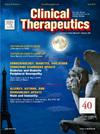Efficacy of Oral Medication in Weight Loss Management: A Systematic Review and Network Meta-Analysis
IF 3.2
4区 医学
Q2 PHARMACOLOGY & PHARMACY
引用次数: 0
Abstract
Purpose
This systematic review was conducted to determine which type of oral medication for obesity provides the best weight loss effect.
Methods
This study adhered to the Preferred Reporting Items for Systematic Reviews and Meta-Analyses 2020 guideline. For this systematic review, we used 3 databases for journal searches: PubMed, ScienceDirect, and Scopus. This study only included randomized controlled trials or open-label clinical trials. There was no year limit used in the journal search for this systematic review.
Findings
Eighteen randomized controlled trials, with a total population of 12,259 patients, were included. Of 18 studies, 15 were used for network meta-analysis. Based on the results of the network meta-analysis, weight loss was found in phentermine/topiramate (mean difference [MD], −3.28; 95% CI, −4.47 to −2.09), semaglutide (MD, −2.92; 95% CI, −4.38 to −1.46), phentermine (MD, −2.31; 95% CI, −3.82 to −0.81), naltrexone/bupropion (MD, −1.68; 95% CI, −2.87 to −0.49), topiramate (MD, −1.67; 95% CI, −2.86 to −0.48), and orlistat (MD, −1.44; 95% CI, −2.32 to −0.55). There were no significant differences among the groups. However, compared with placebo, all oral obesity therapies provide better benefits in weight loss (MD, −2.12; 95% CI, −2.64 to −1.59; P ≤ 0.00001).
Implications
Oral antiobesity drugs provide better weight loss than placebo. However, some side effects can be incurred by utilizing the drug for weight loss, especially related to the gastrointestinal system. Nonetheless, in clinical settings, consideration should be given to particular patients to reduce risk of side effects.
口服药物在减肥管理中的疗效:系统综述和网络荟萃分析。
目的:本系统综述旨在确定哪种类型的口服肥胖药物具有最佳的减肥效果。方法:本研究遵循2020年系统评价和荟萃分析的首选报告项目指南。在本系统综述中,我们使用了3个数据库进行期刊检索:PubMed、ScienceDirect和Scopus。本研究仅包括随机对照试验或开放标签临床试验。本系统综述的期刊检索没有年份限制。结果:纳入18项随机对照试验,共12259例患者。在18项研究中,有15项用于网络荟萃分析。基于网络荟萃分析的结果,芬特明/托吡酯组体重减轻(平均差[MD], -3.28;95% CI, -4.47 ~ -2.09),西马鲁肽(MD, -2.92;95% CI, -4.38至-1.46),芬特明(MD, -2.31;95% CI, -3.82至-0.81),纳曲酮/安非他酮(MD, -1.68;95% CI, -2.87至-0.49),托吡酯(MD, -1.67;95% CI, -2.86至-0.48),奥利司他(MD, -1.44;95% CI, -2.32至-0.55)。各组间无显著差异。然而,与安慰剂相比,所有口服减肥疗法在减肥方面都有更好的效果(MD, -2.12;95% CI, -2.64 ~ -1.59;P≤0.00001)。结论:口服抗肥胖药物比安慰剂有更好的减肥效果。然而,使用这种药物减肥会产生一些副作用,特别是与胃肠道系统有关的副作用。尽管如此,在临床环境中,应考虑到特定的病人,以减少副作用的风险。
本文章由计算机程序翻译,如有差异,请以英文原文为准。
求助全文
约1分钟内获得全文
求助全文
来源期刊

Clinical therapeutics
医学-药学
CiteScore
6.00
自引率
3.10%
发文量
154
审稿时长
9 weeks
期刊介绍:
Clinical Therapeutics provides peer-reviewed, rapid publication of recent developments in drug and other therapies as well as in diagnostics, pharmacoeconomics, health policy, treatment outcomes, and innovations in drug and biologics research. In addition Clinical Therapeutics features updates on specific topics collated by expert Topic Editors. Clinical Therapeutics is read by a large international audience of scientists and clinicians in a variety of research, academic, and clinical practice settings. Articles are indexed by all major biomedical abstracting databases.
 求助内容:
求助内容: 应助结果提醒方式:
应助结果提醒方式:


